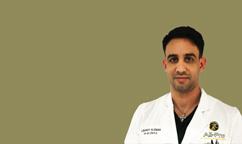
- Dislocated shoulder joints can be extremely painful.
Have you ever watched a baseball pitcher throw a ball and wondered how his arm stayed in the socket? He makes a wild motion, bringing the ball back behind his head and then flinging the entire arm forward with a velocity that would seem capable of cracking a steel locker-room door.
As orthopedic specialists, we marvel at the ability of our shoulders to move freely in just about any direction. However, that’s not unmitigated good news because we also see— all too often— dislocated shoulder joints that are very painful and send the patient directly to the clinic, no stopping at the ball park.
While pitchers seem like prime candidates for dislocated shoulders, in truth they are more often affected by tendon or muscle injuries. Instead, contact sports (like football) are a chief culprit. Another source of dislocated shoulders is trauma— say, from a motor vehicle accident or when a person tries to brace himself with an outstretched arm during a fall.
Determine the Damage
When we say a shoulder is dislocated, we mean that the head of the upper arm bone has been forced out of its socket. Like the pitcher with a ball cradled in his glove, the humerus bone (the ‘ball’) rotates within the glenoid (the ‘glove’). This glenohumeral joint is supported by strong tendons and muscles that stabilize the shoulder and allow freedom of movement.
A dislocation can be partial, whereby ‘the ball’ (bone) just barely moves out of the socket. This is called a subluxation. In the case of a complete dislocation, ‘the ball’ comes completely out of ‘the glove’ (socket).
If the ligaments, tendons and muscles around the shoulder become loose, weak or torn, this dislocation can occur repeatedly. At this point, it is called an unstable shoulder. Such an injury can be initially caused by trauma (an accident, or a hard hit in sports), or by repetitive motion (such as swimming or serving a tennis ball for some patients).
If you experience a shoulder dislocation, you will be well aware of it. Having the ball jump the socket causes pain and inhibits motion. While you may have heard old stories about tough guys re-setting their own shoulders (or their buddies’ shoulders), don’t be fooled by the macho talk. Taking such steps without medical intervention only sets you up for further damage to nerves or ligaments. or chronic destabilization. The doctor is the only one who should be repositioning your bones.
Treatment for Dislocated Shoulders

- There are treatments for dislocated shoulder joint pain.
How do you know if your shoulder is dislocated? The doctor can arrive at a diagnosis and treatment after examining the joint, hearing about an incident that may have caused the injury, and by reading the results of imaging tests such as x-rays and MRI.
There are non-surgical treatment options for shoulder injuries, which might include time off from a specific injury-causing activity. If a shoulder problem is being caused by a sport or a certain type of work, some modification in your exercise regimen or duties will be recommended.
We may also prescribe nonsteroidal anti-inflammatory meds such as aspirin and ibuprofen to reduce swelling. Physical therapy can help recover mobility and keep the supporting muscles strong.
Some types of shoulder dislocation may require surgery. An operation may be performed arthroscopically with tiny instruments and a camera. Other cases may require open surgery, which involves a larger incision so the surgeon can see and access the joint and surrounding structures.
In any case, post-surgical rehabilitation is critical to the success of the treatment. While the process may seem agonizingly slow to a high-performing athlete, it’s necessary to give the joint time to heal. The shoulder may be immobilized temporarily with a sling. Exercises can gradually improve strength and range of motion.
For more information about shoulder dislocation, visit this web page from the American Academy of Orthopaedic Surgeons: http://orthoinfo.aaos.org/topic.cfm?topic=a00529
If you are suffering from shoulder dislocation or would like to speak with a specialist, reach out to us today!











